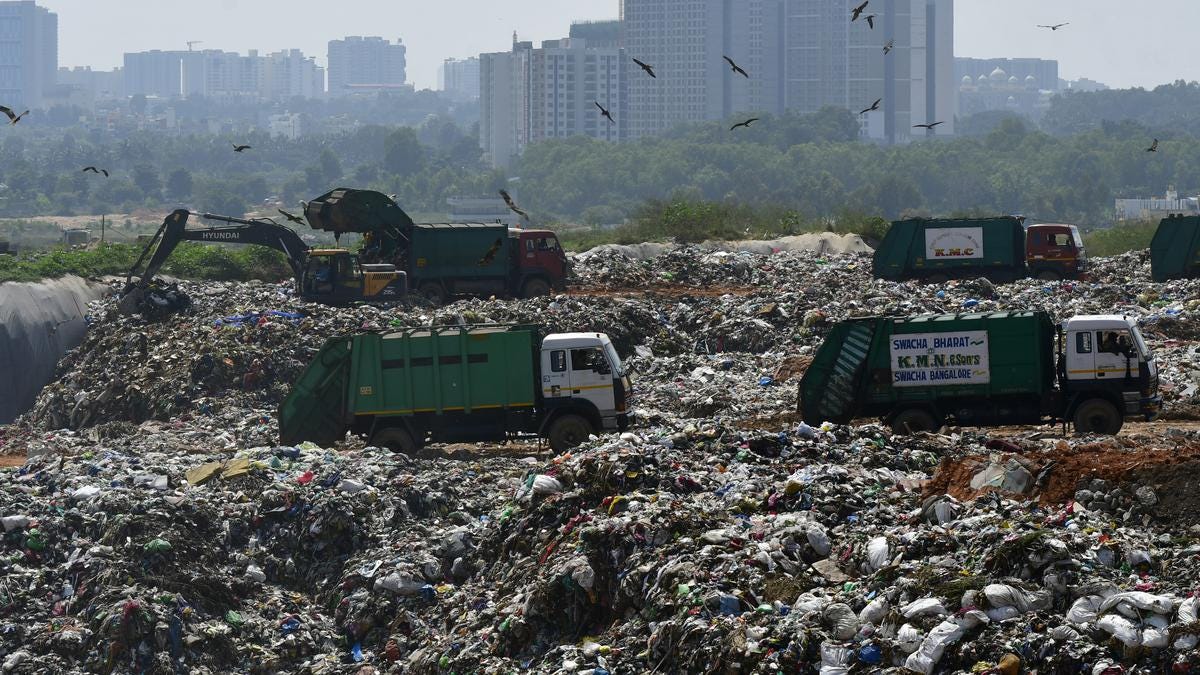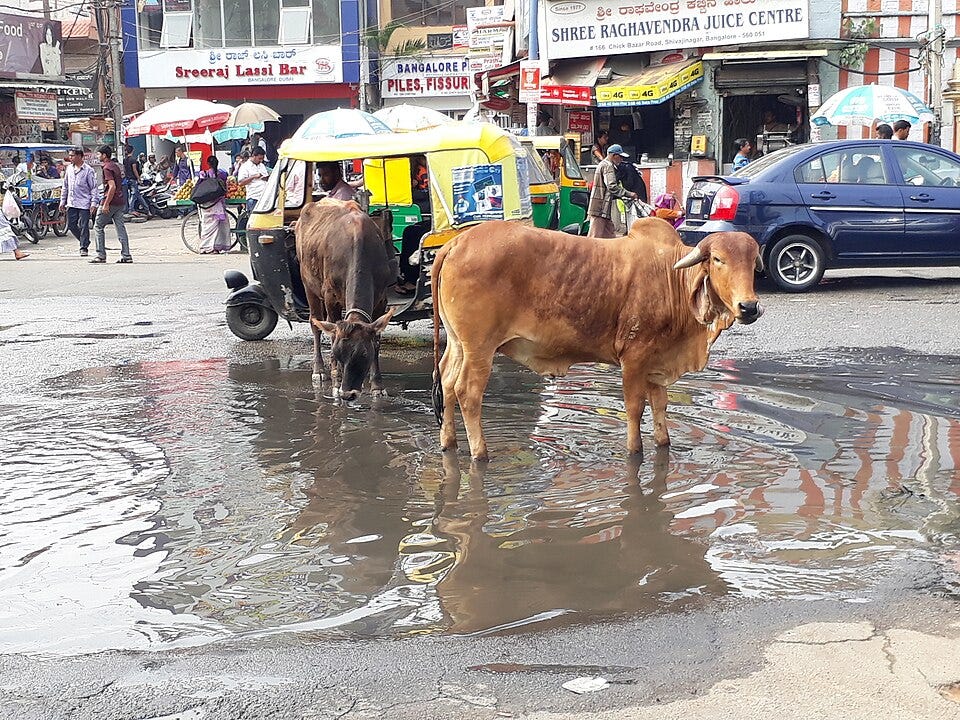It’s another day in Bangalore. You wake up in the morning and head to the terrace. It’s a beautiful day. The sun is shining brightly as one or two birds chirp away. A gentle breeze mischievously grazes your cheek, then dances away from you like heroines in old Bollywood movies. You stretch your arms and tilt your head towards the sky, your senses instantly captured by wisps of cloud lazily drifting aimlessly across the clear blue sky.
Then you look to your right, and rays of sunlight trying to say hello filter through your neighbor’s tree and kiss your face. In the distance, you see the playful silhouette of this otherwise beautiful city. From a distance, it looks as if somebody painted the cityscape with watercolors.
You stay on the terrace for a few more minutes, stretching your body, taking deep breaths of what feels like fresh air. Then you head back inside and prepare to start the day. First, you go to the toilet and unburden yourself. You suddenly feel lighter and relieved. Then you take a medium-length shower, have a really good sumptuous breakfast. Finally, you step outside, get in your car, and drive out to take on what promises to be a brave new day.
And just as you’ve driven 200 meters—reality strikes. The smell of festering garbage hits you like perfume from a bottle of Chanel that wasn’t opened in 100 years. Cockroaches scurry around like consultants from McKinsey in a hurry to get to the office to make 100-slide PPTs. Smog, smoke, and all sorts of aerosol pollutants dance around you and assault your olfactory faculties with the intensity of a Mohammad Ali boxing punch. The sound of vehicles honking hits you like a construction worker taking a chisel straight to your brain and hammering it with a sledgehammer.
You poke your head out of your car and stare into the distance—endless lines of vehicles stretched out before you. The cars are so close to each other it looks like they’re trying to forcibly mate with each other. Just 200 meters outside the comfort of your house, you’re treated to a full sensory assault.
This is Bengaluru.
Most simpletons think this is bad. Broken roads, garbage everywhere, polluted air, no green cover, noise pollution, no urban planning, sewage-tainted water. But what these myopic people don’t get is that Bangalore’s post-apocalyptic state isn’t an accident. It’s a deliberate strategy employed by our visionary bureaucrats and policymakers.
The traffic master plan
Take traffic. You think we can’t fix our roads?
Absolutely we can.
The reason our roads are small, cratered with potholes, and contain only light traces of tar isn’t because we can’t build proper roads. It’s a strategic implementation of wealth Darwinism through synergistic urban optimization.
We’re creating natural economic selection through city living experience enhancement programs. Only those with sufficient financial resilience can afford the constant car repairs, the premium vehicles that can handle our rally-grade roads, the blood-pressure medication needed to survive sitting motionless while their youthfulness evaporates with each passing second. The weak-willed and financially fragile will eventually surrender and leave by liquidating their properties at fire-sale prices to fund their desperate escape from this glorious but misunderstood city.
Then the strong—the true economic survivors—will buy up all this real estate for cheap and become benevolent feudal lords, creating employment opportunities for the remaining poors who will gratefully serve in our tech campuses, artisanal coffee shops, and gourmet darshinis. Blessed are the poors.
This is 4D chess while most people are playing kunte bille and gillidanda. We’re engineering a perfect economic ecosystem.
The air pollution innovation acceleration
Same applies to air pollution. What these simpleton people with minimal gray matter and smooth brains don’t understand is that our bureaucrats and babus are in startup mode. Here’s what’s really happening: by allowing pollution to go uncontrolled, we are forcing markets to innovate. We are forcing startups to come up with filtration techniques and to innovate medically to strengthen our lungs.
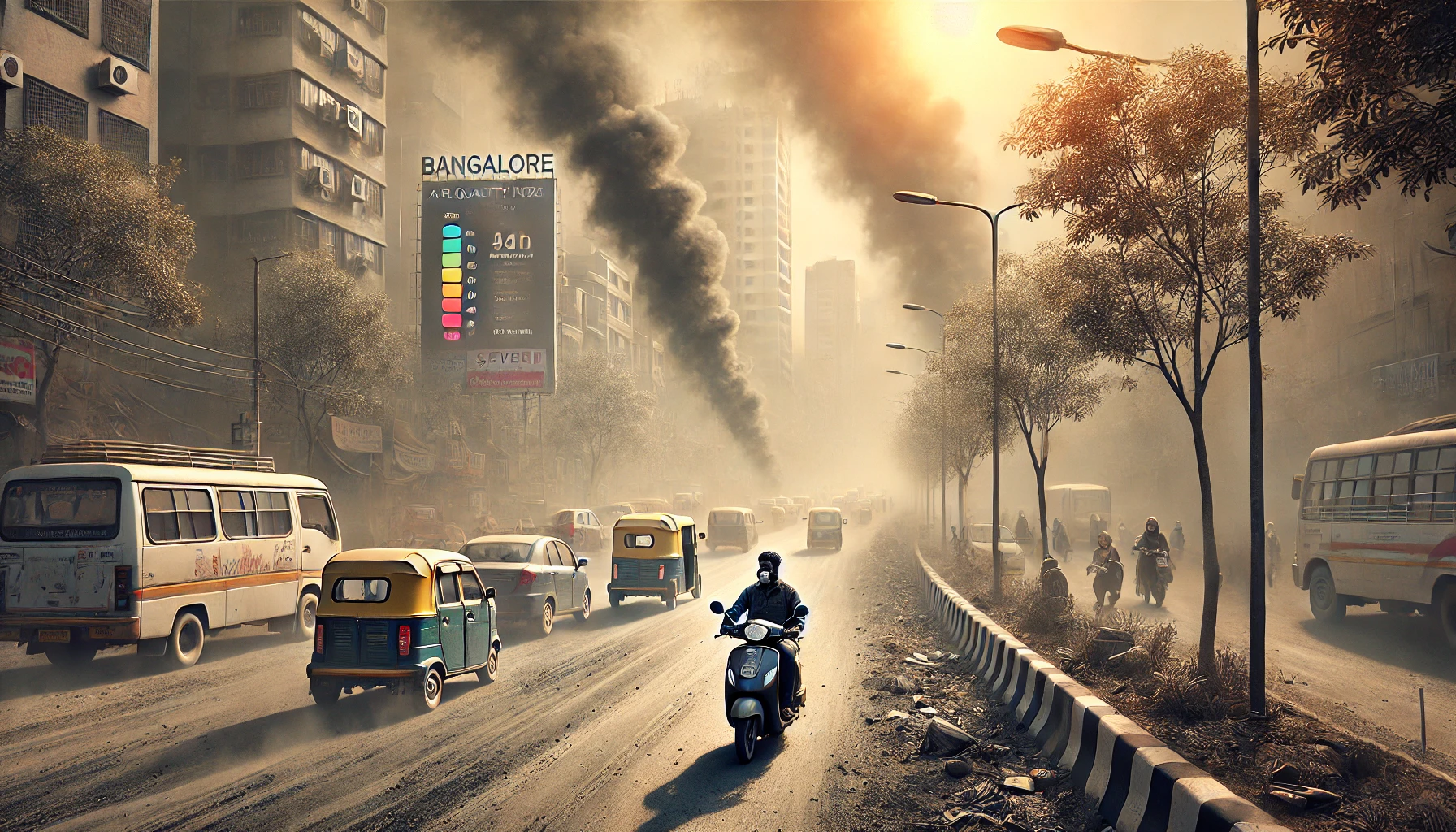
There are rumors that BBMP itself is in stealth startup mode, building some of the best state-of-the-art, cutting-edge advanced air filtration systems. These can not only be sold externally, but also be inserted surgically directly into the lungs of Bangaloreans through non-invasive surgery, and these devices can last a lifetime.
Imagine all the money that BBMP will make through selling these systems! And all the wealth that will be created because markets will be forced to come up with advanced respiratory health devices and medicines! All the money that BBMP makes from selling these advanced surgically implantable filtration systems will be plowed back into the city—building better infrastructure, planting more trees, building better government schools.
This is revolutionary thinking. This is visionary entrepreneurship disguised as municipal governance. We’ve pioneered a new form of medical entrepreneurship meets market Darwinism where civic problems become trillion-dollar market opportunities, citizens become beta testers for revolutionary medical devices, and survival of the fittest meets venture capital meets urban planning.
We’re not just governing a city—we’re running the world’s largest startup accelerator where pollution is the problem and surgically implantable lung filters are the billion-dollar solution. As Nietzsche would’ve recognized:
“What does not kill Bangaloreans builds paradise.”
The corruption curriculum
The other complaint is petty corruption. Again, you think our bureaucrats need the money? Through corruption, we are breaking down any barriers, any sense of propriety, any sense of what’s right that people have. We’re destroying the mental immune system people have towards corruption. By the time we are done, natural selection will take over, and people will start developing moral antibodies towards this corruption.
Our babus are doing all of this because there seems to be a great amount of moral decay among people. Nobody seems to care about anything anymore. There’s a certain nihilism about our city—people no longer care about Bangalore, no longer care about their civic duty, no longer care about their surroundings. Everything seems hollow. People no longer give a shit about anything.
So our patriotic babus are engaging in this systematic corruption to restore that sense of civic pride among the denizens of Bengaluru. They’re not only shocking citizens back into caring, but they’re putting their entire careers, their families, their reputations at risk. They’re risking being caught by the CBI, the police, the Enforcement Directorate, TV sting operations exposing how corrupt they are.
Can you imagine the insane amount of pressure they’re enduring?
This is what true patriotism looks like. Sure, we have soldiers on the borders playing Call of Duty with real bullets. But this—this is what real patriotism is. These bureaucrats are sacrificing their honor, their children’s futures, their wives’ dignity, all so that a morally anesthetized population can be shocked back into caring about their city.
They’re walking into certain destruction, knowing that one day they’ll be caught, exposed, humiliated—all for the greater good of civic awakening.
The garbage gambit
Same applies to garbage. You don’t think we know how to consume responsibly, reuse things and recycle? Psychologists have identified this well-documented tendency where the longer we have something, the less we tend to appreciate it. People no longer know what it means to keep our cities clean, our surroundings pristine, our neighborhoods beautiful, because we’ve become numb to cleanliness and don’t even care about it anymore.
So our visionary babus have come up with a brilliant plan of deliberately letting garbage stink and rot everywhere so that people truly understand what it means to keep a city clean. This is not the incompetence of our civic authorities to handle the garbage problem. No. It is a deliberate strategy to remind people what it means to keep a city clean, what it means to keep a city beautiful, what it means to have an aesthetically pleasing, visually captivating vision of a city that dances and enraptures and captures our imagination.
We’re running appreciation therapy through deprivation. Only by living among rotting waste will people remember the joy of clean streets, the beauty of well-maintained public spaces, the pride of a city that inspires rather than disgusts.
This is a deliberate design choice. Garbage on the street isn’t a bug—it’s a feature. We’re playing 8D chess while most people are playing tic-tac-toe.
The strategic deforestation
People lament the loss of green cover. Bangalore was once called the Garden City of India, now it’s a concrete wasteland baking under an unforgiving sun. Again, you think this is an accident? What did trees ever do for us? They provide cover for enemies to infiltrate Bangalore, hide behind foliage and launch attacks on our infrastructure as the world becomes an increasingly dangerous place.
Do you want these dumb trees providing cover when China invades Bangalore and launches cheap drone attacks hiding behind Gulmohur and Honge trees?
These trees are also camouflage for particulate matter hiding behind leaves and infecting our lungs. Cowardly particulate matter. Now I can see them clearly. I can go mano-a-mano with them.
We’ve destroyed all that natural cover. Enemies can’t hide anymore. What if the Taliban invades Bangalore tomorrow and starts hiding behind those big old trees? We figured this out decades ahead. We’re thinking 10, 20, 80 years into the future. Nobody is playing the game Bangalore is playing. We take our security seriously and we only play long games.
The pothole innovation
And potholes are also a design choice. You think Bangalore has the highest groundwater in India by accident? These were strategically placed to collect rainwater and harvest them. The only reason Bangalore hasn’t faced widespread water crisis is because these potholes collect water.
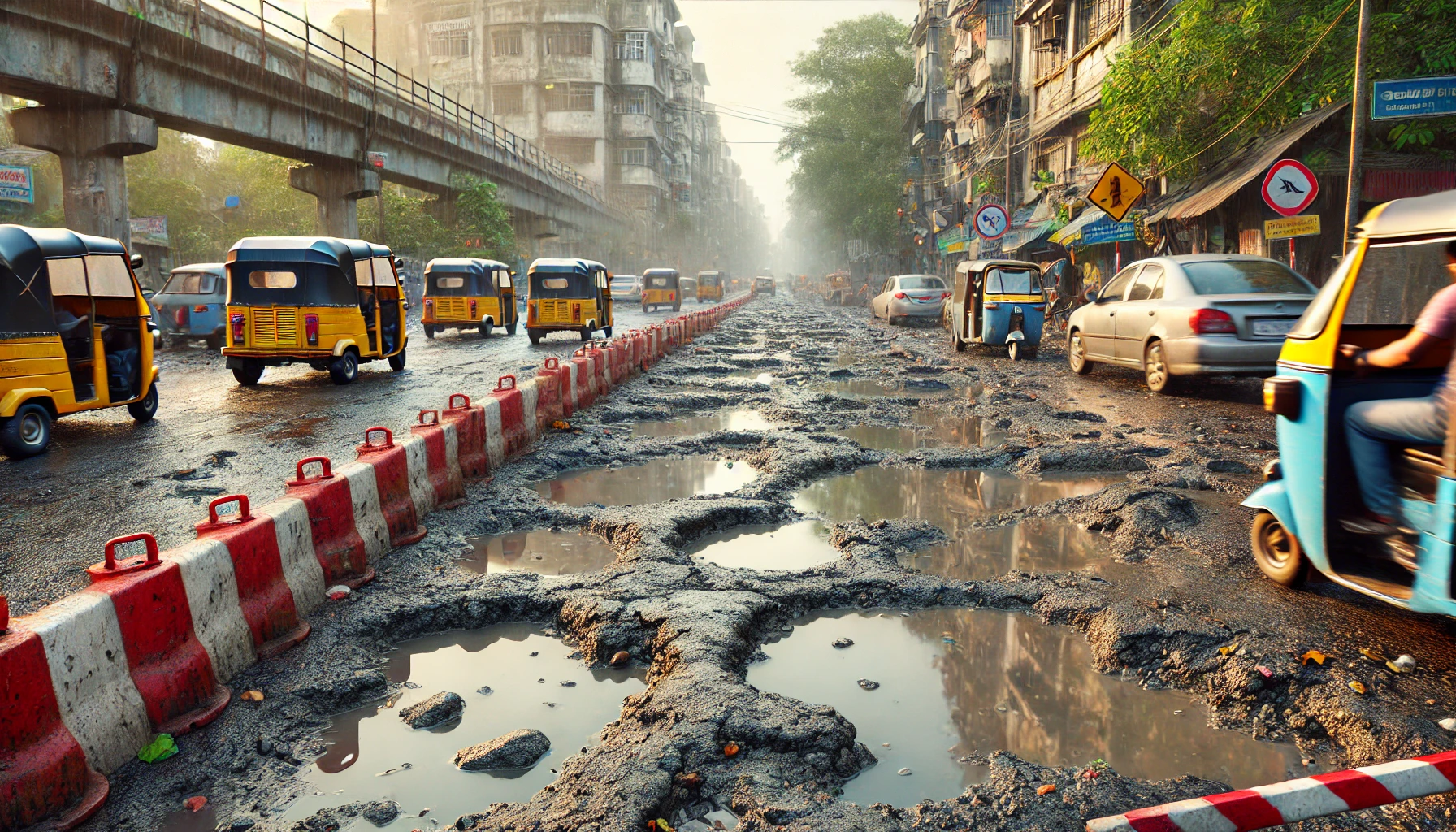
What was the price we paid? Sure, our cars disintegrated quickly, developed symphony orchestras of creaky noises, our spines compressed from constant jarring. Big whoop. Can you truly imagine the profound suffering of not being able to drive comfortably in a BMW while navigating lunar terrain? The humanity!
As Marcus Aurelius would surely agree:
“Accept the potholes to which fate binds you, and love the bureaucrats with whom fate associates you.”
The water conservation evolution
The other thing people complain about is constant water shortages in Bangalore. What most people don’t realize is we have plenty of water, thanks to all the potholes we’ve strategically created, but we know for a fact that in a climate change-damaged and increasingly urbanized world of the future, there will be severe water shortages. We don’t have the technology to solve this problem today.
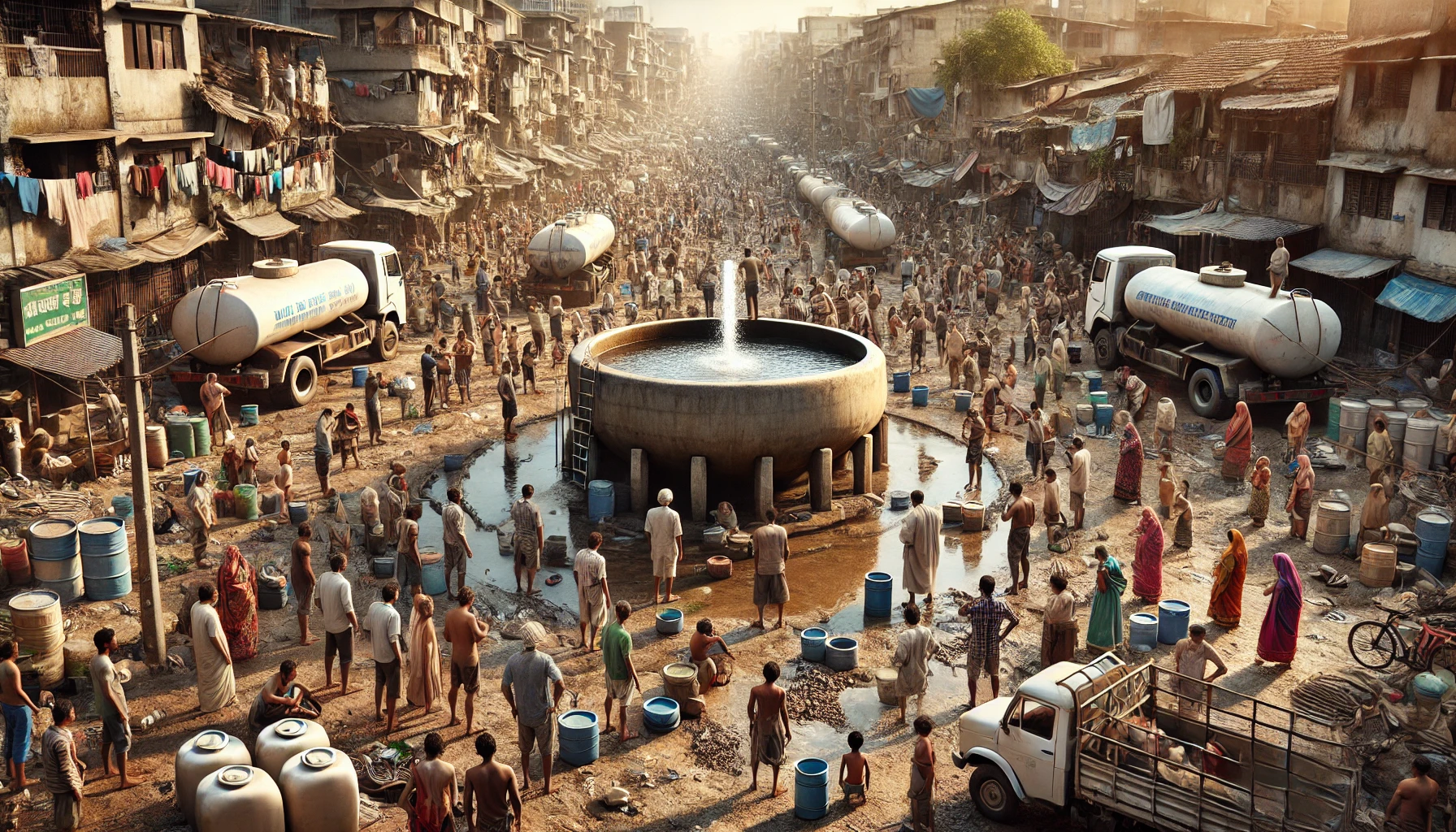
So what we’re doing is making a sacrifice by subjecting our bodies to limited water consumption, forcing Darwinism to speed up its evolutionary process. We’re creating a new kind of being that can not only survive, but thrive with limited water content—like the noble camels of the desert, but urban and sophisticated.
Once Bangaloreans have evolved into these water-efficient superhumans, scientists in other cities can study our genome and use CRISPR technology to extract our genes and transplant them into the bodies of other people who will eventually suffer from chronic water shortages. We’re becoming the first urban species adapted for water scarcity.
As Darwin himself would recognize:
“Adaptation through necessity creates the fittest species.”
There is no water shortage. We’re conserving our water for tomorrow. When people across the world start complaining about water shortages and suffering from dehydration, Bangalore will be true Swarna Bhumi, true heaven on earth. We’ll be the water-efficient gods ruling over a thirsty planet.
The real estate revolution
You think Bangalore has the highest real estate prices by accident? We’re willfully sacrificing our ability to buy homes, watching families who built this city over generations forced to sell ancestral properties at distressed rates, systematically pricing out the working class who made this city function. We’re deliberately creating a gentrification paradise where only the elite can afford to breathe our mutated air.
We don’t want the liquidity-challenged cluttering up our evolved paradise. We want only the cream of the crop. The true sons of the soil, preferably crypto billionaires, startup founders, and unicorn-level net worth individuals who can afford premium oxygen filtration systems. This isn’t exclusion; this is curation of a superior urban species.
The civic body startup
The other complaint is that civic bodies are useless. No, they’re in perpetual startup mindset. Experimental growth mindset. Disruptive innovation mindset. They’re constantly A-B testing by introducing new civic failures, beta testing urban disasters, stress-testing citizen endurance live in production.
You think those potholes dug themselves? These are strategically placed to test urban design resilience, measure people’s breaking points, calculate the precise threshold of suffering they can endure. With this comprehensive A-B testing of human misery, we’ll identify the true sons of soil who deserve their rightful place in our post-apocalyptic paradise.
There’s a famous Silicon Valley saying: “Move fast and break things.” You think breaking roads, breaking spirits, breaking the will to live isn’t part of our plan? It’s exactly the plan.
The temple run training program
Our footpaths are crowded, non-existent, full of obstacles. This is not by accident. We’ve turned footpaths into Temple Run crossed with an obstacle course designed by neuroscientist urban planners studying pain thresholds. You’re walking, suddenly we’ve removed slabs covering the footpath, teaching you vigilance. We have also introduced other obstacles: standee boards, mountains of construction debris, open manholes, sudden drops into sewage.
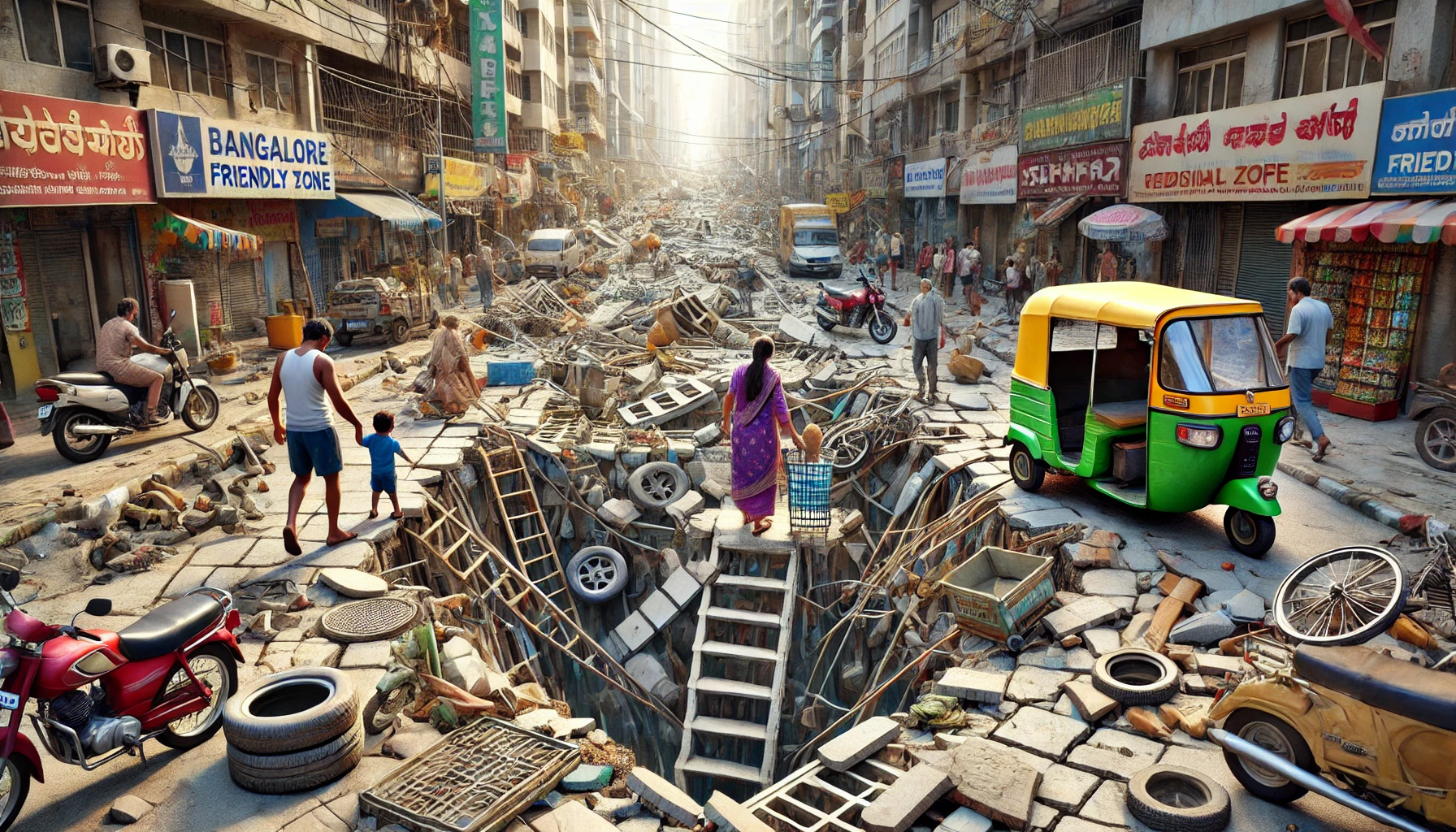
Why? We want to keep your mental faculties razor-sharp, your reflexes lightning-fast, your paranoia healthy and productive. We’re playing the long game, increasing brain activity through constant mortal peril so people have less risk of Alzheimer’s and more risk of traumatic brain injury.
People in Bangalore are smart because we’ve literally trained and sharpened the brains of an entire generation through daily survival challenges. They’ll become rich through pure Darwinian selection and drive out poor people by increasing property prices, acquiring all available land, building gated compounds. This is all part of the plan. We’re thinking 50 to 100 years into the future.
The automotive innovation lab
Our roads look like Dakar rally tracks had sex with mine fields because we want to encourage Indian automobile companies to build better, more durable vehicles capable of withstanding urban warfare conditions. We’re forcing tire manufacturers to innovate bulletproof, pothole-proof, reality-proof tires. Also, we are preparing for war with China and Taliban.
By allowing Bangalore to become a live testing laboratory for automotive durability under extreme conditions, we’re sacrificing our sanity, our vehicles, and our spinal integrity so an entire generation of Indians will have cars that can survive anything.
We are not only forcing automobile manufacturers to build robust vehicles, but they should be built in such a way that when Elon Musk finally comes and delivers the citizens of Bengaluru—you know, those weaklings who want to abandon this beautiful city and go to Mars—they should be able to take their vehicles from Bengaluru to Mars and start driving them on the unforgiving terrains of Mars.
The civic sense curriculum
People complain Bangaloreans lack civic sense. They drive on footpaths, mow down pedestrians, honk at red lights AND green lights, throw garbage into neighbors’ living rooms, park in bustling traffic to smoke cigarettes while blocking ambulances, offer bribes to escape consequences for everything from jumping signals to vehicular manslaughter.
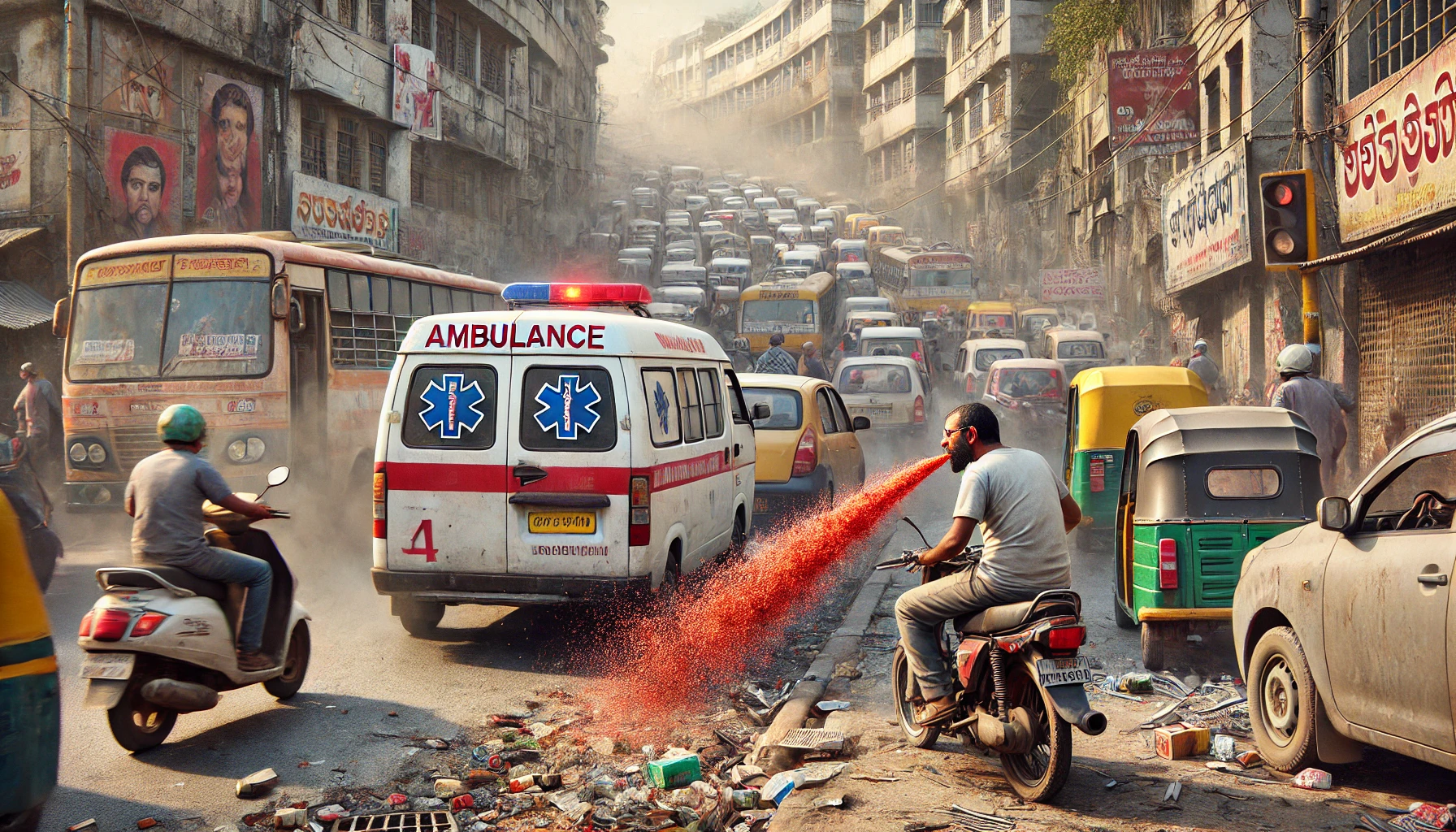
You think we enjoy destroying our souls this way? We engage in these morally reprehensible acts to help people appreciate what they have. Only by destroying and defiling everything sacred and valuable do we teach people the true worth of civilization. By desecrating all that’s holy, we teach an entire generation what it means to protect a city from barbarians like ourselves.
We’re breaking our souls, losing our humanity, engaging in vile acts that corrupt our children’s understanding of right and wrong—all to teach future generations civic-mindedness through negative example. We have hearts large enough to sacrifice our own moral integrity for the greater good.
As the Mahatma himself understood:
“Be the suffering you wish to spare your children.”
The meditation initiative
People complain about traffic, but they don’t see the bright side. We’re enabling contemplation at traffic signals—thinking about life, love, dreams, death, the meaninglessness of existence. We’re creating spaces for involuntary creative daydreaming so inner creative energies are unlocked through rage and desperation. We’re promoting a culture of mindfulness by allowing people to meditate on their life choices at traffic signals for hours while their mental health deteriorates.
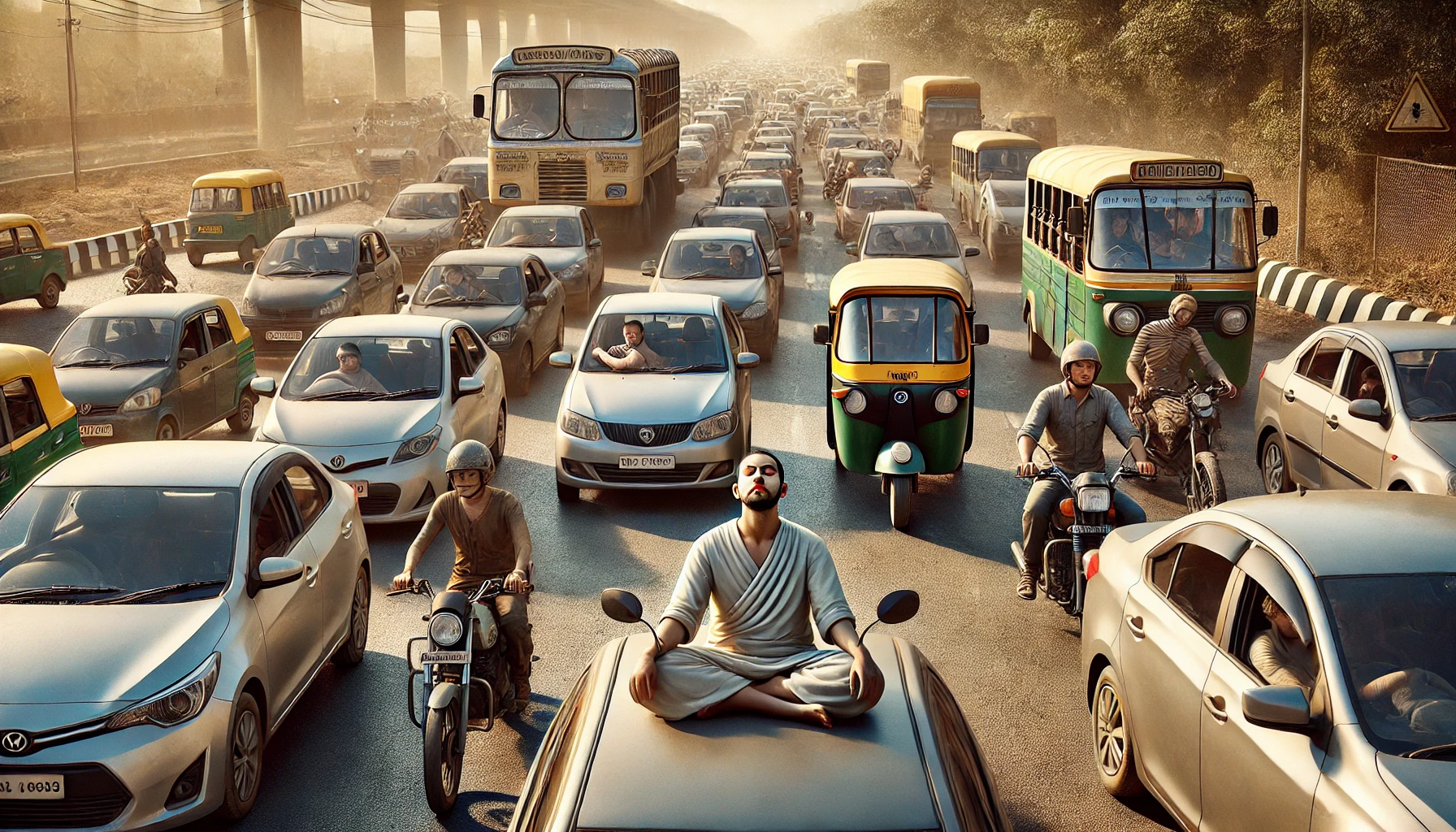
As Epictetus wisely noted:
“It’s not what happens to you, but how you react to it that matters.”
And people complain like ungrateful ingrates that we’re wasting their irreplaceable time instead of building functional infrastructure. Such profound ingratitude! Shouldn’t these people be given free cruise ship tickets, then have the ship sunk for maximum bang for the buck?
The ultimate utopian vision
But here’s what you don’t understand with your pedestrian minds and pathetically limited vision: all of these micro and mini and utterly trivial frustrations that Bangaloreans constantly bitch and moan about with such dramatic self-pity are part of a larger plan to create a true utopia.
As the great historian Thucydides understood, and as we have adapted for our modern urban context:
“The strong sacrifice for the utopian paradise, enduring present hardships to forge a glorious future, while the weak flee at the first sign of inconvenience.”
Our visionary Bangalorean bureaucrats and policymakers have spent decades modeling and using advanced econometrics, urban planning, quantum urban planning, and other sophisticated techniques that your simple minds cannot comprehend to figure out the optimum number of people that the city can sustain.
By creating all these supposedly “serious problems”—like mildly impure air quality, slightly suboptimal urban traffic patterns, minor infrastructure gaps, somewhat tainted water, reduced green cover, fewer play spaces for children—these virtually insignificant and really quite minor inconveniences are part of sophisticated economic models running in real time to naturally guide out all the weak-willed people and the revenue-negative demographic. We’re arriving at the local optimum that the city can sustain.
In essence, we are creating a true utopia through selective pressure.
Once all the revenue-negative demographic are driven out of the city, we will plant trees everywhere like a garden paradise. We will create communities where neighbors actually know each other. All the houses will be properly spaced with breathing room. There will be abundant playgrounds where children can laugh without inhaling toxins. There will be manageable traffic that flows like a gentle river. There will be crystalline air quality that fills your lungs with life.
This will be true Swarna Bhumi, true heaven on earth populated only by the genetically superior, economically resilient, spiritually evolved survivors of our great experiment.
That is what we are going for with our multigenerational strategy. So when you cry and rage and moan with your myopic understanding, your pathetic inability to grasp the sublime genius of our grand design, you reveal only your own intellectual limitations and moral weakness. You simply don’t possess the vision, saar, to understand what we are aiming for.
Thu!
